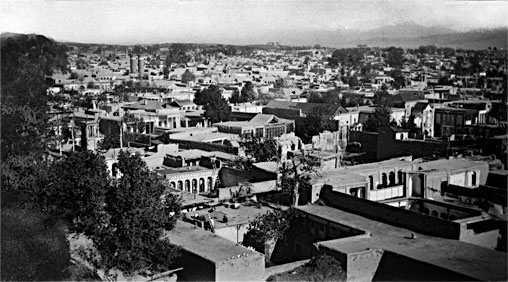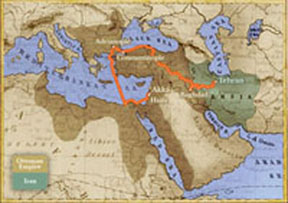The Story of Baha’u’llah: Promised One of All Religions
Excerpt 1: Banished
Baha’u’llah stood before the grand vizier dressed in the dirty, ragged clothes of a prisoner. His body was bruised and cut from the heavy chains He had worn, His feet still not healed from the bastinado beating. Yet He stood with a strength and dignity of spirit that even the Black Pit could not diminish.
Baha’u’llah’s battered condition did not soften the heart of Mirza Aqa Khan. “Had you chosen to take my advice,” said the grand vizier, “and had you dissociated yourself from the faith of the Siyyid-i-Bab, you would never have suffered the pains and indiginities that have been heaped upon you.”
“Had you, in your turn, followed my counsel,” Baha’u’llah replied, “the affairs of the government would not have reached so critical a stage.”

The grand vizier recalled what he had once told Baha’u’llah – that the death of the Bab would be the end of His Cause. But Baha’u’llah had replied at the time, “The flame that has been kindled will blaze forth more fiercely than ever.” His prediction had proven all too true.
The Cause of the Bab had spread, and so had the violence against the Babis. Everywhere in Persia the followers of the Bab were suffering. Authorities arrested and imprisoned them. Mullas stirred their countrymen to violence against them, while government officials gave them no protection. Order in the land had given way to daily bloodletting and chaos. Even hardened executioners were amazed at the uncontrolled cruelty of the mobs.
“The warning you uttered has, alas, been fulfilled,” admitted the grand vizier. “What is it that you advise me now to do?”
“Command the governors of the real to cease shedding the blood of the innocent,” Baha’u’llah replied, “to cease plundering their property, to cease dishonouring their women and injuring their children. Let them cease the persecution of the Faith of the Bab; let them abandon the idle hope of wiping out its followers.”
The grand vizier followed Baha’u’llah’s advice. That same day he sent an order addressed to all the governors of the realm, telling them to stop their cruel acts. “What you have done is enough,” the grand vizier wrote. “Cease arresting and punishing the people. Disturb no longer the peace and tranquillity of your countrymen.”
At last there was rest from the killing. The bakers and butchers, shoemakers and blacksmiths, put away their shameful instruments of torture. The sound of drumbeats was no longer heard in the market square. The terrible noise of mobs bent on murder gave way to the more usual noises of the marketplace. Things seemed almost as they had always been, but they were not.
In the bloodbath of killing, many thousands of Babis had died – men, women, and children.* Only small numbers of Babis remained here and there, but their spiritual leaders were gone, and the Cause they loved so dearly seemed in danger of disappearing.
Still the shah and his government were not satisfied. They wanted no trace of the Bab and His Cause left in Persia. As soon as Baha’u’llah was released from prison, He was ordered to leave the country. The Russian ambassador invited Him to go north to Russia, but Baha’u’llah declined that offer. Instead, He received permission to go west to Iraq, to the city of Baghdad and its surrounding area. Baha’u’llah and His family were allowed one month to prepare for the journey. . . . .
The family of exiles passed through the southwest gate of Tehran, leaving behind the city that Baha’u’llah would call “the holy and shining city.” “Let nothing grieve thee, O Land of Ta [Tehran],” Baha’u’llah would later write, “for God hath chosen thee to be the source of joy of all mankind . . . Rejoice with great joy, for God hath made thee ‘the Dayspring of His light,’ inasmuch as within thee was  born the manifestation of His Glory.”
born the manifestation of His Glory.”
Baha’u’llah would praise, as well, the many Babis of Tehran who had sacrificed their lives for the Cause of God. “How vast the number of those sanctified beings, those symbols of certitude, who, in their great love for thee, have laid down their lives and sacrificed their all for thy sake! . . . . . .
Which one of the multitude of thy sincere lovers shall We remember, whose blood hath been shed within thy gates, and whose dust is now concealed beneath thy soil? . . . Our Pen is moved . . . to extol the victims of tyranny, those men and women that sleep beneath thy dust.”
The group of exiles would never enter the gates of Tehran again. Once beyond the borders of Persia, they would never again see their homeland.
They were banished forever from the life they had known and the people they had loved. One day the name of Baha’u’llah, “the Glory of God,” would be honored by people in every nation on earth, but His hardships were far from over, and His greatest struggles were only just beginning.
